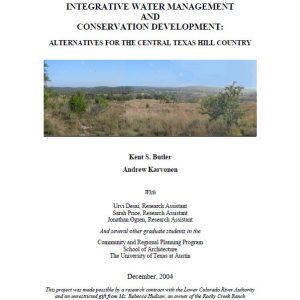Integrative Water Management and Conservation Development: Alternatives for the Central Texas Hill Country

In the Central Texas Hill Country, citizens and local governmental entities are at a crossroads—new development proposals are prompting public action on long-term issues concerning regional water supplies, water reclamation and reuse, and storm runoff pollution control. Each land use/water supply decision that is made in the region has the potential to result in significant consequences in terms of future water supplies, economic cost, and ecological impact. The planning and design of new residential developments and water management strategies for the Hill Country will shape the future of the region in terms of water use, cost of living, water quality, and landscape/environmental stress. Various new approaches, such as “low-impact development,” “conservation development” and “integrated water management” have recently been pursued, but have not been sufficiently documented or critically evaluated.
In this study we will examine the Rocky Creek Ranch, a 468-acre tract located on Hamilton Pool Road in western Travis County. We will propose, model, and then critically analyze three alternative residential development scenarios, all prepared for this same tract. Each scenario is critically analyzed in terms of water supply and demand, water reclamation, impacts on downstream water quality, and economic cost. Our study makes a critical and quantitative assessment of the ways in which households and communities use water for domestic purposes. We find exciting opportunities to manage water much more efficiently in residential developments by integrating what are normally independent and unconnected water service functions of local utility operations. We will pose challenges for those who will bear the economic costs and environmental consequences of living in the Hill Country landscape.